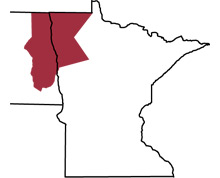1863 & 1864: Treaties with the Chippewa Red Lake & Pembina Bands
Signed October 2, 1863 at “Old Crossing,” MN and April 12, 1864 in Washington, D. C.
By 1863, business interests in Minnesota had been trying to secure the Red River Valley for more than a decade. In 1851, the Ojibwe had ceded this area in a forced treaty that was not ratified by the Senate because of Southern concerns over the expansion of non-slave territories. The secession of the South in the Civil War removed this opposition, and the Dakota War of 1862 created a significant State and federal military presence in the area. These factors created the opportunity for Alexander Ramsey to engineer the infamous “Old Crossing” treaty.
Ramsey, who had resigned the Minnesota governorship to become a commissioner of Indian Affairs earlier in the year, arrived at the treaty site with nearly 300 troops and a Gatling gun. He presented the treaty as an agreement to allow businesses – notably Norman Kittson’s transportation companies – to pass through Ojibwe territory. But the treaty as written ceded 11,000,000 acres in present-day Minnesota and North Dakota to the U.S. The Ojibwe were to receive $20,000 per year for 20 years, and “Indian traders” – notably Norman Kittson -- would receive up to $100,000
In addition, “each male adult half-breed or mixed-blood … who has adopted the habits and customs of civilized life, and who is a citizen of the United States” would receive a 160-acre homestead – which also benefitted traders who had married into Ojibwe families.
Before ratifying the 1863 treaty, the U.S. Senate made significant changes, and several Ojibwe signers refused to endorse the amended version. A delegation was taken to Washington to negotiate a new version of the treaty in 1864, which increased the annuity payments for the ceded territory.
In subsequent actions after the end of the treaty-making era, the Red Lake Ojibwe ceded nearly 3,000,000 additional acres. Their remaining land comprises the Red Lake reservation which – unlike any other reservation in the U.S. – was never allotted to individuals and so is held in common by Red Lake band members today.
Bishop Henry Whipple on the Red Lake treaties: "from beginning to end a fraud…”









